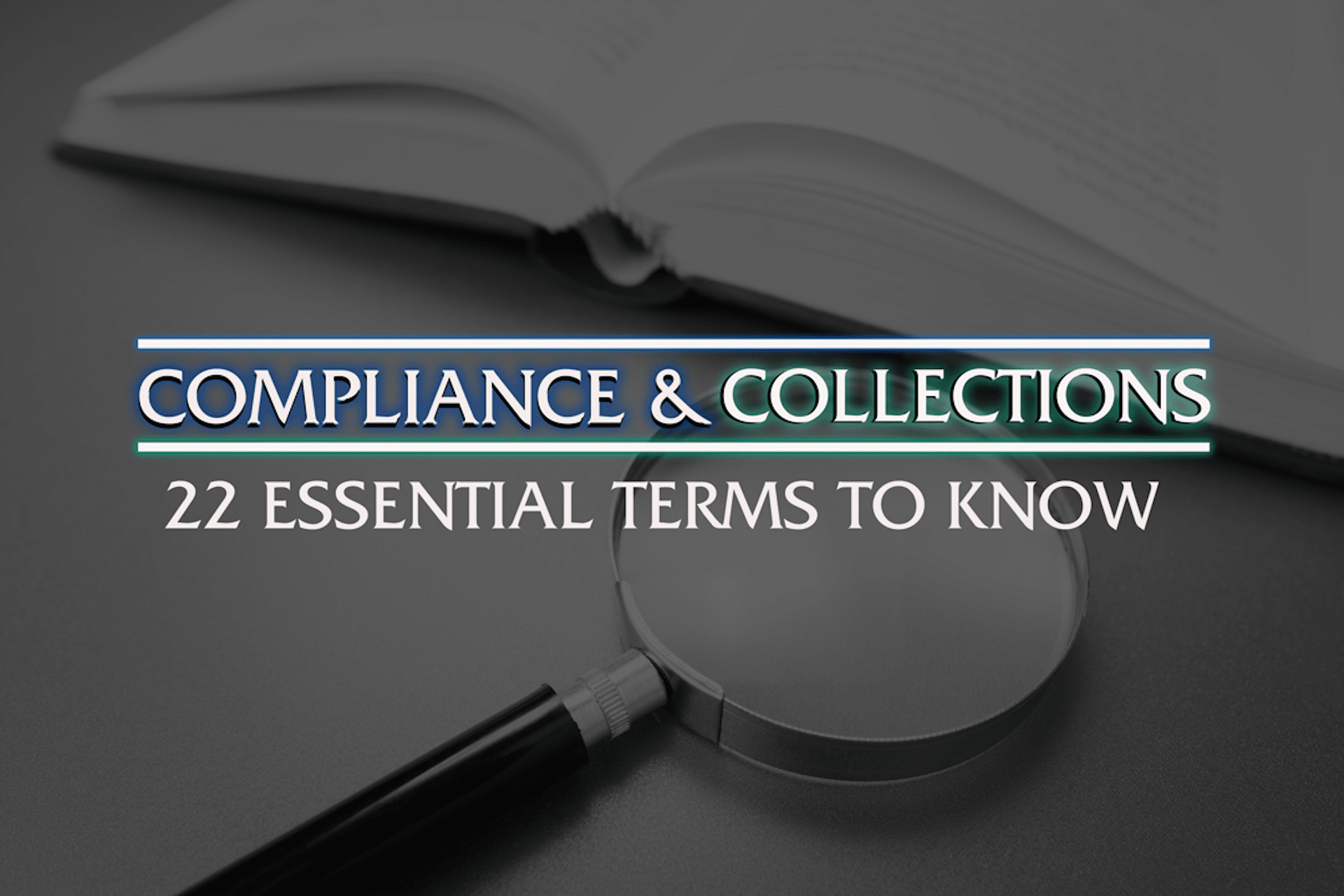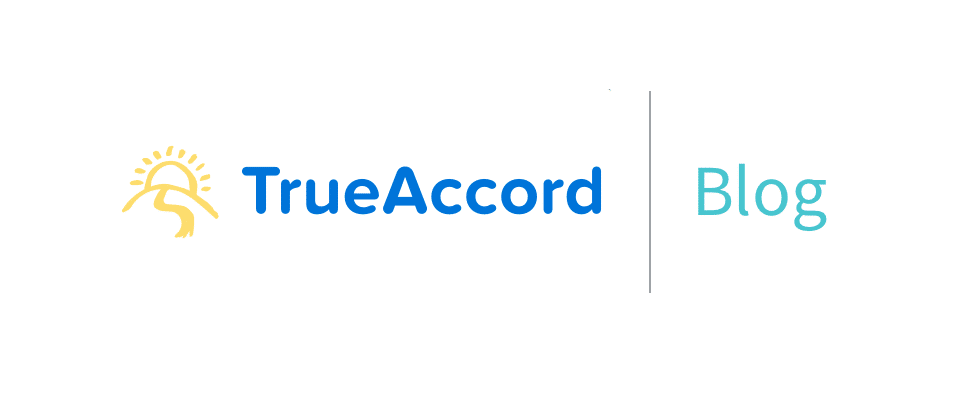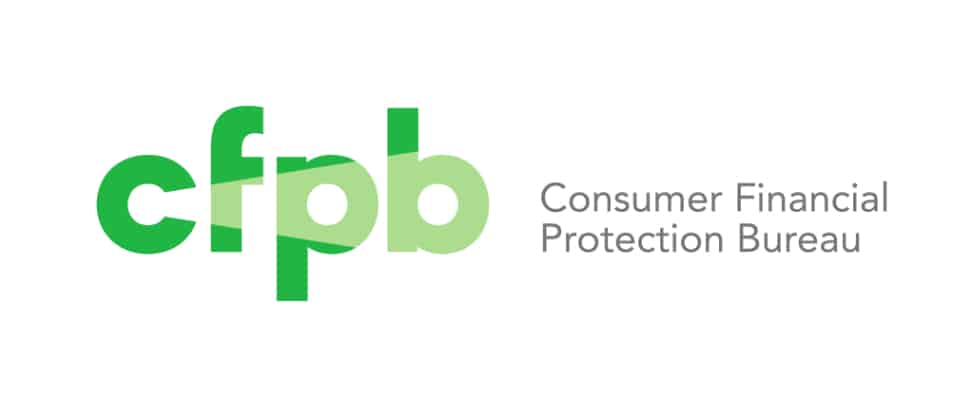
The world of regulatory compliance can be a complicated place, especially when it comes to debt collection. It can be tricky for non-security and compliance professionals. To help quickly get you up to speed on what auditors are referring to, we’ve put together a glossary, covering some of the most important compliance terms and acronyms.
- Action Plan: A plan to identify and facilitate remediation steps of current operating practices.
- Audit: An unbiased and comprehensive examination of an organization’s compliance and adherence to regulatory guidelines.
- Benchmarking: The process of analyzing an organization’s performance data and comparing it against the industry standard. Used to see the effectiveness of a compliance program and if there are any areas that need improvement.
- Best Practices: When law and/or regulation is unclear, a “best practice” policy may be implemented to safeguard a business’s compliance.
- Bona Fide Error Defense: An unintentional mistake or violation that occurred despite the maintenance of procedures reasonably adapted to avoid the mistake/violation. A debt collector may be able to assert a “Bona Fide Error Defense” in a lawsuit alleging violations of the federal Fair Debt Collection Practices Act (FDCPA).
- CCPA: The California Consumer Privacy Act (CCPA) gives consumers in California rights over the personal information that businesses collect and process about them.
- CFPB: The Consumer Financial Protection Bureau (CFPB) is an agency of the United States government responsible for consumer protection in the financial sector.
- Code of Ethics: A document or guide that is composed of an organization’s values, standards commitments, and a set of principles.
- Compliance: The state of adhering to established guidelines or specifications such as a policy, standard, specification, or law.
- Compliance Management System: A series of integrated policies, processes, tools, internal controls, and functions designed to help an organization manage, monitor, and test compliance with applicable laws and regulations (e.g., federal, state, local/municipal). A fully functioning compliance management system is designed to continuously minimize risk, prevent consumer harm and limit financial or reputational harm to the organization. An essential in the modern business world.
- Compliance Risk: Captures the legal, financial, and reputational dangers for failing to act in compliance with laws and regulations.
- Conflict of Interest: A conflict that happens in a decision-making situation in which an individual or organization is unable to remain impartial and where serving an interest would harm another.
- Controls: A checks put in place to ensure compliance with a policy and procedure. A control could be automated or manual.
- Dodd-Frank Act: Dodd-Frank Wall Street Reform and Consumer Protection Act is a US federal law that governs the financial industry by enforcing transparency and accountability with rules for consumer protection, such as its Unfair Deceptive Acts and Practices provision.
- FDCPA: The Fair Debt Collection Practices Act (FDCPA) is a consumer protection law passed by Congress in 1977 to eliminate abusive debt collection practices and insure that those debt collectors who refrain from using abusive debt collection practices are not competitively disadvantaged.
- Fraud: The act of intentionally lying and cheating in order to obtain an unauthorized benefit.
- Governance: A formal framework made up of policy rules, processes, procedures and controls used to control risk and ensure accountability and transparency.
- Gray Area: A situation where the rules are not clear and can be open to interpretation.
- Regulation F: A rule implemented by the Consumer Financial Protection Bureau (CFPB) providing rules governing activities covered by the Fair Debt Collection Practices Act (FDCPA). It seeks to clarify and expand on the FDCPA, including requiring collection agencies to provide additional information to consumers as part of the validation disclosure and clarifies rules for the use of digital communications.
- Remediation: The process of recognizing a compliance issue or deficiency and implementing an action plan to correct the deficiency or enhance/strengthen an area of compliance. For remediation to be successful, the new or revised policies, processes or controls must address the deficiency or issue and to minimize risk.
- Risk Assessment: The process of identifying and analyzing all potential risks that an organization can face in relation to its legal and regulatory obligations. The results of risk assessments are prioritized based on severity and then used to determine areas of focus for risk mitigation.
- Safe Harbor: A provision in a statute or regulation that protects against legal or regulatory liability in situations where the safe harbor provision conditions are met.
- Transparency: The act of being open and honest while disclosing as much information about policies, procedures, and activities as possible.
Now armed with your glossary of terms, get ready to investigate the world of compliance in collections further in our upcoming webinar. Join us Thursday, September 29th at 1pm ET for our interactive webinar, The Future of Collections & Compliance, hosted by TrueAccord Associate General Counsel Lauren Valenzuela and Director User Experience Shannon Brown.
Reserve your space now for an interactive discussion on:
- Cutting edge digital collection compliance
- The role of the legal team in creating a digital collection strategy
- How cutting edge compliance drives collection revenue
- The future of digital compliance
Register now for the upcoming webinar»»



